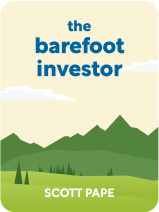

This article is an excerpt from the Shortform book guide to "The Barefoot Investor" by Scott Pape. Shortform has the world's best summaries and analyses of books you should be reading.
Like this article? Sign up for a free trial here .
Do you want to make significantly more money than you are currently making? What are some realistic ways to boost your baseline earnings?
Money does not grow on trees. If you want to make more money than you are currently making, you have to be willing to make some fundamental changes.
Here are three strategies that will help you make more money plus some questions to help you decide which one will work best for you.
How to Make More Money
Usually, people who want to boost their finances try to do that but cutting their expenses. But cutting your spending only goes so far. Plus, the more you cut, the more you have to downgrade your lifestyle. Instead, consider the bigger picture and think of ways to make (not save) more money. Here are three strategies to consider:
Strategy #1: Ace Your Performance Review
Acing your performance review could help you get a raise by showing you have the skills to achieve results. It could also help you move into roles that pay more. The best-paying roles tend to involve managing people or selling products.
To ace your performance review, take on work you haven’t done before and deliver on it. Here’s how:
- Make notes of the main tasks involved in your job.
- Set ambitious goals for each one.
- During your performance review, ask your boss for feedback about your goals.
- Over the next year, schedule time to work on your goals a little bit each day. This could include increasing your sales, or facilitating quarterly training sessions for your teammates.
- Before your next performance review, prepare new goals and practice showcasing what you’ve achieved in the past year.
- At the review, ask for a raise or a promotion into a higher-paid role. Ideally, aim to make an additional $5,000 each year.
Strategy #2: Transition to Another Career
Getting promoted or getting a raise are great ways to earn income, but they aren’t possible for everyone. You might not feel invested in your company, or even in the type of work you’re doing. Instead, consider changing careers to do something that you’re more passionate about.
It takes time to build the skills necessary to change careers or become self-employed as a contractor or freelancer. Here are some tips:
- Don’t quit your job outright. Instead, take on a side job or work for free in the field that you’d like to enter, and work to build up your paid work over time.
- Network with people in your new field. Schedule meetings with them to learn how to succeed and connect with paid work opportunities.
Strategy #3: Freelance
Freelancing is a great way to earn extra money. There are two ways to do this:
- Use your existing skills. For example, if you’re a teacher, you could tutor on the side.
- Or don’t. If you’re simply interested in a certain line of work, volunteering is a great way to learn the skills associated with that work.
Recovering from Divorce: Matt Ledger’s Story
Matt Ledger got a divorce when he was 54, leaving him with few savings. What little he had left, he put toward helping his daughter finish her last two years of school, which left him with even fewer savings. He also didn’t own a home or have much money saved in super, despite being just a few years away from retirement age.
Ledger wanted to earn more money so that he could save more. He realized that his job as a real estate agent brought inconsistent income, and he decided to go back to driving road trains. In just a year, he saved $5,700, put $15,000 in Backstop, increased his super contribution, and built a small house. He’s on track to putting $35,000 in savings, $75,000 in Backstop, and having $1 million in super in just five years.
Exercise: Increase Your Income
Develop a plan to increase your income.
What do you like about your current job?
What do you dislike about your job?
Considering your answers, which strategy for increasing your income appeals to you most? (Will you ace your performance review, transition to a new career, or freelance?) Why?
Write down the first three steps you need to take to pursue your chosen strategy.

———End of Preview———
Like what you just read? Read the rest of the world's best book summary and analysis of Scott Pape's "The Barefoot Investor" at Shortform .
Here's what you'll find in our full The Barefoot Investor summary :
- A 10-step plan to eliminate debt and build wealth
- How you can increase your income
- Why you need to focus on cultivating long-term investments






